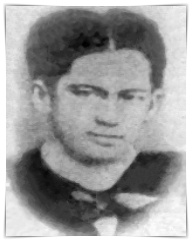
JOSE RIZAL, the national hero of the Philippines and pride of the Malayan race, was born on June 19, 1861, in the town of Calamba, Laguna. He was the seventh child in a family of 11 children. Both his parents were educated and belonged to distinguished families.
At the age of 3, he learned the alphabet from his mother; at 5, while learning to read and write, he already showed inclinations to be an artist. He astounded his family and relatives by his pencil drawings and sketches and by his moldings of clay. At the age 8, he wrote a Tagalog poem, "Sa Aking Mga Kabata," the theme of which revolves on the love of one’s language.
In 1877, at the age of 16, he obtained
his Bachelor of Arts degree with an
average of "excellent" from the Ateneo
Municipal de Manila.
|
|
In the same year, he enrolled in Philosophy
and Letters at the University of Santo
Tomas, while at the same time took courses
leading to the degree of surveyor and expert
assessor at the Ateneo.
|
In 1878, the young man also enrolled in the University of Santo Tomas as a medical student. He later quit the school, alleging discrimination against Filipino students by the Dominican professors. On June 21, 1884, at the age of 23, he was conferred the degree of Licentiate in Medicine and on June 19,1885, at the age of 24, he finished his course in Philosophy and Letters with a grade of "excellent."
Rizal as a Boy Magician
Since early manhood Rizal had been interested in magic. With his dexterous hands, he learned vicarious tricks, such as as making a coin appear or disappear in his fingers and making handkerchief vanish in thin air. He entertained his town folks with magic-lantern exhibitions.
Rizal economised on his living expenses, and with the money he saved, he purchased books from a second-hand book store owned by certain Señor Roses. He was able to build a fair-sized private library.
Rizal as a Musician
Rizal had no natural aptitude for music, and this he admitted. But he studied music because many of his schoolmates at Ateneo were taking music lessons.
By sheer determination and constant practice, Rizal came to play flute fairly well. He was a florist in various impromptu reunions of Filipinos in Paris.
Rizal as Historian
Rizal's research studies in the British Museum (London) and in Bibliotheque Nationale (Paris) enriched his historical knowledge. His knowledge of foreign languages enabled Rizal to read historical documents and books in languages in which they were originally written.
Since early manhood Rizal had been interested in magic. With his dexterous hands, he learned vicarious tricks, such as as making a coin appear or disappear in his fingers and making handkerchief vanish in thin air. He entertained his town folks with magic-lantern exhibitions.
Rizal as Lover of Books
A favourite past time of Rizal in Madrid was reading. Instead of gambling and flirting with women, as many young Filipino did in Spanish metropolis, he stayed at home and read voraciously until midnight. Since early childhood, he liked to read.Rizal economised on his living expenses, and with the money he saved, he purchased books from a second-hand book store owned by certain Señor Roses. He was able to build a fair-sized private library.
Rizal as a Mason
In Spain, Rizal came in close contact with prominent Spanish liberal and republican Spaniards, who were mostly Mason. Rizal's reason for becoming a mason was to secure Freemasonry's aid in his fight against the Friar's in the Philippines.Rizal as a Musician
Rizal had no natural aptitude for music, and this he admitted. But he studied music because many of his schoolmates at Ateneo were taking music lessons.
By sheer determination and constant practice, Rizal came to play flute fairly well. He was a florist in various impromptu reunions of Filipinos in Paris.
Rizal as Historian
Rizal's research studies in the British Museum (London) and in Bibliotheque Nationale (Paris) enriched his historical knowledge. His knowledge of foreign languages enabled Rizal to read historical documents and books in languages in which they were originally written.
Trial and Execution:
The Philippine Revolution broke out in 1896. Rizal denounced the violence, and received permission to travel to Cuba in order to tend victims of yellow fever in exchange for his freedom. Bonifacio and two associates sneaked aboard the ship to Cuba before it left the Philippines, trying to convince Rizal to escape with them, but Rizal refused.
He was arrested by the Spanish on the way, taken to Barcelona, and then extradited to Manila for trial. Jose Rizal was tried by court martial, charged with conspiracy, sedition and rebellion.
Despite a lack of any evidence of his complicity in the Revolution, Rizal was convicted on all counts and given the death sentence.
He was allowed to marry Josephine two hours before his execution by firing squad on December 30, 1896. Jose Rizal was just 35 years old.

Photo courtesy by https://en.wikipedia.org/wiki/José_Rizal
Jose Rizal's Legacy:
Jose Rizal is remembered today throughout the Philippines for his brilliance, his courage, his peaceful resistance to tyranny, and his compassion. Filipino school children study his final literary work, a poem called Mi Ultimo Adios ("My Last Goodbye"), as well as his two famous novels.
Spurred on by Rizal's martyrdom, the Philippine Revolution continued until 1898. With assistance from the United States, the Philippine archipelago was able to defeat the Spanish army. The Philippines declared its independence from Spain on June 12, 1898. It was the first democratic republic in Asia.










No comments:
Post a Comment